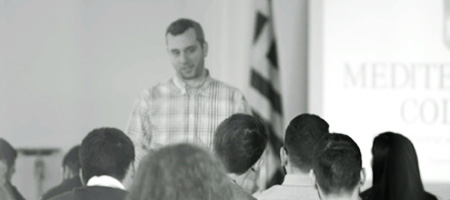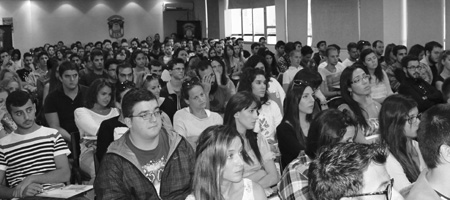
BEng (Hons) Civil Engineering & Construction
- The School of Engineering at Mediterranean College – founded in 2005 – is the pioneer in the delivery of higher education Engineering courses in Greece.
- The course leads to professional recognition and practice, through the UK Engineering Council, and with further studies can also lead to full professional rights in Greece (chartered engineer status).
- The course covers the four basic civil engineering areas: Structural, Geotechnical, Hydraulic and Infrastructure, being contextualised to the Greek engineering industry (legislation issues, etc).
- The course includes Computer Aided Design, design and project management, and also focuses on dynamics, structural analysis, reinforced concrete and steel structures.
- Students have access to modern facilities, both at the College’s in-house workshops and at the partner organisations state-of-the art labs, to do their practical training, projects and internships.
Civil Engineering & Construction



Course Information
This programme is validated by the University of Derby and aims to prepare students as graduate Civil Engineers for a successful career in the Construction field. Graduates may obtain the license to practice the profession as Incorporated Engineers (IEng) and if they continue towards postgraduate studies, they can apply for full professional rights as Chartered Engineers.
The programme addresses high school graduates who wish to build a career in Civil Engineering.
Requirements for registration:
- High School leaving certificate (Apolyterion) from a General or Vocational Senior High School (or equivalent)
- Reference Letter (1)
- Adequate knowledge of English (IELTS 4.5 or equivalent) *
- Academic Interview
- Photos (2)
- ID-Card/ passport
* Candidates without official English language certificates can sit the English language placement test of Mediterranean College.
Holders of Higher National Diplomas (HND) or Institute of Vocational Training (IEK) diplomas, students of Technological (TEI) or Higher Education Institutions (AEI) of relevant fields may be admitted to an advanced stage of the course, upon a Recognition of Prior Learning procedure. They need to additionally submit:
- Diploma and/or academic transcript
- Programme Handbook (if available)
The course consists of 20-credits module and a 40-credit diploma thesis in the final year. The first two years are taught and assessed in Greek and the remaining two are taught and assessed in English.
Students are expected to work on real projects and case studies and participate in field trips to worksites and workshops, so as to apply in practice everything they have learnt in class and develop the knowledge and skills the industry requires from graduate engineers.
| Year 1 | Year 3 | Year 3 | Year 4 |
|
Mathematics for Study in Technology |
Applied Mathematics 1 |
Infrastructure Design 2 |
Geotechnics 3 |
|
Scholarship for Technologies |
Civil Engineering Construction |
Applied Mathematics 2 |
Civil Engineering and Construction Management |
|
English for Study in Technology Part A |
Construction CAD and Personal Development |
Project Planning and Development |
Advanced Structural Analysis and Design 3 |
|
Engineering Science |
English for Study in Technology C |
Fluids and Drainage Engineering |
Fluid Mechanics 3 |
|
Introduction to Structural Analysis and Dynamics |
Structures 1 |
Structural Design and Assessment 2 |
Independent Study & Professional Development (Civil Engineering and Construction) |
|
Construction Materials Technology |
Geology and Soil Mechanics |
||
|
English for Study in Technology Part B |
Site Surveying |
You’ll learn through a mixture of lectures, tutorials and laboratory work. A considerable amount of e-learning support material is also provided. The learning methods we use are:
- Lectures, to cover theory.
- Seminars, to solve problems and discuss case studies.
- Computer labs, to train in the latest design, project management and simulation software.
- Labs & workshops, to apply theory, run tests and experiments.
- Clinics (supporting classes), to tackle the most difficult parts of the modules.
- Tutorials, to provide one-on-one support to students.
- Independent learning, where students engage in self-directed study.
Student learning is further enhanced through:
- Guest lectures, by industry experts who provide contemporary professional expertise and invaluable networking opportunities.
- Supervised independent study, where experienced academic tutors help students transit from the academic to the professional environment.
- Real industry projects, in order to practice the profession in a simulative environment.
- Regular company visits and field trips/ exercises.
- Real case simulations, such as the job interview simulation.
- Optional internship
- Access to multiple on-line and off-line resources that facilitates independent learning.
Students are assessed in a variety of ways, including:
- Individual and multiple type group work.
- Lab experiments.
- Presentations
- Individual research.
- Exams
- Mediterranean College’s School of Engineering was founded in 2005 and was the first to provide higher education Engineering courses in Greece.
- The degree may lead graduates to obtain the Incorporated Engineer status by the UK Engineering Council, while it gives them the basis to pursue full professional rights in Greece (chartered engineer status), through further study and work experience. See jbm.org.uk for further information.
- The course covers the four basic civil engineering areas – Structural, Geotechnical, Hydraulic and Infrastructure – and contains modules relevant to the Greek industry, such as dynamics, structural analysis, reinforced concrete and steel structures, making the degree recognition process by the Greek Authorities more straightforward.
- The course content takes into account both the European and the Greek legislative framework,offering students the flexibility for employment in Greece and in other European countries.
- The course is significantly enriched with technical design and CAD, along with design and structures simulation modules, so that students acquire practical skills. Its focus on management and project management enables graduates to develop entrepreneurial activityand pursue higher managerial positions in the technical sector.
- The School of Engineering operates in-house Engineering workshops with all the necessary devices, machinery and software. It also links with external laboratories and companiesin order to ensure that students access large-scale, lab test cases.
- The learning process is further enhanced by a variety of educational activities(guest lectures, field trips, seminars, etc.) and an optional internship scheme, leading to more employable graduates.
- The programme is delivered in both Greek and English, so that students are gradually and smoothly introduced to studying in English. English lessons are provided during the 1st and 2nd year of study, specially designed to cover terminology and to help students meet the requirements of the English-taught part of the programme (students therefore do not need additional English tuition). Students receive the support of the College’s English Department throughout their studies. As graduates of a UK University (being taught in English) they certify their English as a foreign language competence at a Proficiency (C2).
- Mediterranean College gives particular emphasis on theacademic support of undergraduate students: a personal tutor is assigned to every student; lecturers are available at office hours; students with difficulties may use the services of the counselling and learning support centre; students receive regular feedback on their academic progress; students have full access to the College’s libraries and electronic resources
- Mediterranean College has developed an integrated Employability plan, the MC Employability Scheme, focused on the contemporary needs of our Computing students: career counseling and professional development, regular guest lectures, real projects, seminars, networking events, employability fair, internship scheme.
- All academic staff are accredited lecturers of the University of Derby for every module they teach. Mediterranean College implements an integrated system of recruitment, assessment and continuing professional development of academic staff, so that students receive excellent teaching and personal support to develop their social and professional skills.
- The University of Derby (Guardian University Guide 2017) is a TOP-50 UK University and in the TOP-10 for student employability. This stems from constantly developing the curriculum as directed by employers, professional and accreditation bodies.
Graduates of the programme, according to the Greek law, are holders of an accredited university degree, professionally equivalent to those awarded by Greek State Higher Education Institutions. If they wish so, they can have their degree recognised by the Greek authorities. Click here for more information on the degree recognition procedure.
Being graduates of an accredited UK University, they are eligible to apply for the Incorporated Engineer (IEng) status with the UK Engineering Council. If they continue their studies towards a Master’s degree and also secure some work experience, they will be eligible to upgrade their status into a Chartered Engineer, with full professional rights both in the UK and in Greece. See www.jbm.org.uk for further information.
After successfully completing the programme, graduates may continue for a Master’s degree at Mediterranean College or at overseas universities. Alternatively, they can seek employment. BEng (Hons) holders may attend the following Master’s programme offered by Mediterranean College:
Those who wish to combine Engineering with Management and pursue higher managerial positions in the Engineering industry can opt to attend the following postgraduate courses:
Alternatively, they can specialise in Energy Conservation and Management by following a CPD course offered in Mediterranean Professional Studies.
BEng (Hons) Civil Engineering and Construction graduates can seek employment in:
- Technical/ construction companies & agencies
- Engineering planning & consulting agencies
- Construction materials & machine trading companies
- Repair companies
- Workshops and laboratories
- Consulting agencies
and as self-employed Civil Engineers.
Testimonials
My experience at the College taught me many things that will help me in my professional career. Among those things are consistency and an ethical approach to the work place. I would like to take this opportunity to thank all my tutors for the excellent work they performed, which has made my studies painless, leaving a very pleasant experience and a feeling that my efforts were worthwhile....
Diogenis Vakontios, BSc (Hons) Mechanical Engineering
An exciting period of my life came to an end. It was three unforgettable years through which I gained the necessary knowledge on the subject of Civil Engineering. Among the various events, visits and workshops that I attended with my classmates, in a climate of cooperation and a common purpose, I completed my studies at Mediterranean College. There was a genuine cooperation between the College staff and students, who...
Aggelos Fois, BSc (Hons) Mechanical Engineering
I'd never go anywhere else, because I would be bored, there's so much things to do as a mature student, the college is amazing, the people are great and you never get bored!...
Andreas Lazarides, BSc (Hons) in Civil Engineering



